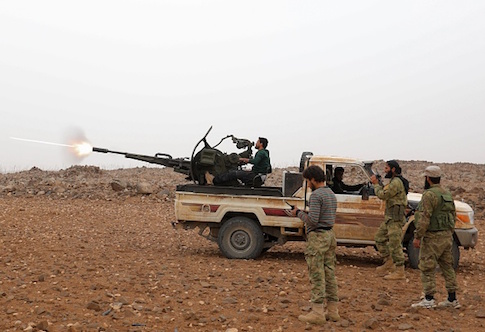The Syrian military, backed by Russian forces, renewed its offensive in southwestern Syria on Thursday after a four-day pause during which rebels attempted to negotiate an end to violence with Russian officials.
Syrian and Russian forces, after pausing air strikes Saturday evening, commenced strikes and pushed deeper into rebel-held territory after a ceasefire deal broke down Wednesday, the Associated Press reports.
The offensive in Daraa province, which began June 19, has displaced an estimated 330,000 people and killed many civilians. The Syrian Observatory for Human Rights reported some 600 air strikes in Daraa province and said Syrian troops are now only six miles from a strategic border crossing with Jordan.
Ibrahim Jabawi, a rebel spokesman, criticized the manner in which Russia approached negotiations. "These were not negotiations but pressures, dictations, threats and humiliations," he said.
Jabawi said the Russians demanded the rebels relinquish their weapons before continuing discussions. Rebels countered that they would give up their weapons when displaced residents began to return and Iran-backed militias left the province.
Iran-backed groups also continue to play a role in the fighting, supporting President Bashar al-Assad. Hezbollah is helping to lead Assad's offensive in southwestern Syria by both directing Syrian forces and deploying its own forces, Haaretz reported.
Speaking about the current offensive, a commander in the regional alliance supporting Assad said, "Hezbollah is a fundamental participant in planning and directing this battle."
The offensive has also raised concerns for the hundreds of thousands displaced by the battle. "Daraa residents are effectively trapped – many of those who are displaced are living in makeshift tents in the searing heat with insufficient food, water or medical care, and with the constant fear of being exposed to attacks at any given point," said Lynn Maalouf, Amnesty International’s Middle East research director.
"The bombardment has not stopped for one moment since the announcement that the negotiations failed," said Samer Homssi, a resident of Daraa who is fleeing violence with his family.
"We are living here in the olive trees, afraid of everything, the shelling, the insects, with no water to drink or any medical services nearby. The situation is very difficult," Homssi continued.
